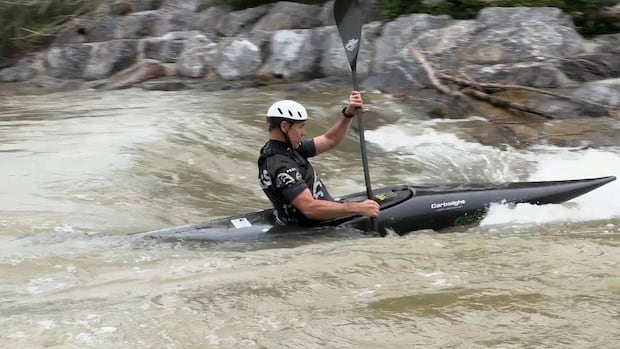Boaters, paddlers push back on Alberta's watercraft pass idea
The province launched a survey on Friday to take feedback on a potential annual fee
The provincial government made a big splash with water recreation groups on Friday, when it launched a public survey looking for feedback on a potential new watercraft pass.
The annual fee's purpose, the province said, would be to keep invasive mussels, like zebra or quagga mussels that can devastate aquatic ecosystems, out of Alberta. It would apply to watercrafts like kayaks, canoes, motorboats and jet skis. The survey will run until Aug. 25.
The province said it's interested in hearing from the public about how much the pass should cost and how it should be applied, including whether it should be used on a per-boat or per-operator basis. But boaters and paddlers around Alberta have raised concerns with the idea, said Alberta Whitewater Association executive director Mike Holroyd.
Holroyd said his group has worked with the province on invasive species prevention in recent years, but the survey took them by surprise.
"What they're really after is trying to stop the mussels from coming into the province, which is from the east and the south, and instead they're going with this shotgun approach that's kind of all over the province, which doesn't make a lot of sense," said Holroyd.
More engagement with key stakeholders would be better before a public survey, Holroyd said. He added he believes motorboats or sailboats entering Alberta are likely the bigger problem the province faces with invasive mussels.
"Our boats, recreational small boats, they're in the water for maybe a couple hours and then they're out of the water," said Holroyd. "It seems unlikely that that's going to spread things more than say fishing gear or people playing by the water."
Zebra and quagga mussels currently aren't found in Alberta. But in the province's announcement of its new survey, it said there's an increasing risk of these mussels around North America.
"Zebra mussels alone cause up to $500 million annually in damages to power plants, water systems and industrial water intakes in the Great Lakes region," said the Office of the Minister of Environment and Protected Areas in an emailed statement on Monday.
"No decision has been made on next steps. We will look forward to hearing Albertans' thoughts before determining how to move forward."
Revenue from a potential watercraft pass would fund prevention, monitoring and education efforts, including inspection stations and mussel-sniffing dog teams, the province said.

If the new pass is implemented, Holroyd said he'd like to see some of the revenue it generates go toward improving access to Alberta's lakes and rivers.
Earlier this year, Alberta implemented mandatory watercraft inspections for every boat entering the province from its eastern and southern borders. In 2024, 15 watercrafts were confirmed positive for invasive mussels in Alberta.
Increased rental, lesson costs
The cost of an annual pass could place greater strain on local businesses, which in turn would drive up the price of lessons and equipment rentals, said Rocky Mountain Paddling Centre owner Mark Taylor. He said the added cost could make the sport less accessible.
"It's like a blank cheque for the province. You know, it seems like another money grab," said Taylor.
"We already pay to access the provincial parks now, we already pay to go into the backcountry. Paddling was supposed to be a free sport once you bought all the equipment, and now it's turning into another expensive thing that makes it harder for people to access."
While the province mandates boats entering Alberta to stop at an inspection station, Taylor said the stations aren't open 24 hours per day and aren't always located close enough to the provincial borders.
Setting up inspection stations so boats entering the province must immediately be cleaned to ensure they're not bringing mussels in would better serve Alberta, Taylor suggested, adding that a fee hitting boats travelling within the province misses the mark.
"Fish swim, water moves, but the mussels and things like that, the invasive species as it were, if they're not here, then there isn't a risk of transporting them from place to place," said Taylor.
With files from Brendan Coulter


